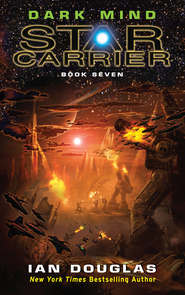По всем вопросам обращайтесь на: info@litportal.ru
(©) 2003-2025.
✖
Battlespace
Настройки чтения
Размер шрифта
Высота строк
Поля
“Now imagine, instead of subatomic particles, what you have whirling around inside that giant racetrack are tiny black holes. And they’re moving at close to the speed of light.”
“Black holes? My God, why?”
“Best guess is that what we’re looking at here is an inside-out Tipler Machine.”
“A what?”
“Here’s the data.”
Frank Tipler had been a prominent physicist at the turn of the twenty-first century. Among other things, he’d suggested the mechanism for a means of bypassing space, of jumping from here to there without the tedious process of moving through the space in between. His scheme had called for building a very long cylinder, one hundred kilometers long, ten kilometers wide, and made of neutronium—the ultra-dense collapsed matter of a neutron star. Rotate the thing two thousand times a second, so the surface is moving at half the speed of light. Theoretically, according to Tipler, the rotating mass would drag space and time with it, opening paths through both above the surface. By following a carefully plotted course around the rotating cylinder, a starship pilot could cross light-years in an instant … and would be able to fly back and forth through time as well.
The whole thing was just a thought experiment, of course. No one seriously expected anyone to ever be able to squash neutron stars together in order to make their own time machine.
But someone, evidently, had figured out another way to do the same thing.
“So that thing’s a time machine?” Ramsey asked after he’d had a moment to digest the download.
“Space and time,” Foss replied. “Space-time equivalence, remember? We think this must be one of several identical gateways, constructed around different stars. You fly into one and come out another. We don’t know if they use the time travel component at all, though the smart money says they don’t. They would screw causality to hell and gone if they did. Now. Watch. …”
Visual: The stargate appears from a different angle, suspended against the background haze of the Sirian system. Something appears in the middle, a little off-center. One moment there is nothing there; the next, there is something, a golden object rendered tiny by the scale of the vast Wheel. The scene magnifies, zooming in for a closer look. The object appears to be a ship of some sort, needle slender, but somewhat swollen aft, golden-hued. Data readouts show the object to be over two kilometers long.
Ramsey felt his scalp prickle as he watched the ship grow rapidly larger. The vessel appeared to accelerate suddenly, leaping toward him. …
The image cut off in a burst of white noise and electronic snow.
He blinked. “Okay,” he said slowly. “We have first contact with a high-tech civilization. Who are they?”
“That,” Foss replied, “we don’t know.”
“What happened to the Wings of Isis?” The words were hard, grim.
“We don’t know that, either. Whatever happened, of course, happened ten years ago, while you were still on Ishtar. We have to assume that the Wings of Isis was destroyed, since two more years passed after these images were recorded and transmitted, and we’ve heard nothing from them. That might have been an accident or …”
“Or enemy action. The Hunters of the Dawn?” Ramsey’s heart was beating a little faster now and he felt cold.
“Again, Colonel. We don’t know. But we hope you and your people will be able to tell us.”
“Huh. You don’t believe in easy assignments, do you, sir?”
“This is the Marine Corps, son,” Foss told him. “The only easy mission was the last one.”
2 (#ulink_f740cfa5-7cbe-59e3-afbc-bc6fdf07c957)
27 OCTOBER 2159
Marine Receiving Barracks Star Marine Force Center Twentynine Palms, California 1825 hours, PST
“So what’s the dope, Gare?” Lance Corporal Roger Eagleton asked. “You hear anything?”
“Nope,” Garroway said around a mouthful of steak-and-cheese. “You think they tell me anything?”
“You’re the one with the famous Marine ancestor,” Kat Vinton told him.
“I guess. So why would that mean they’d tell me what’s going on?”
“I don’t know. With your name, we figured they were grooming you for a recruiting tour, y’know?”
“Yeah,” Corporal Bill Bryan added. “Just to keep you happy, so’s you can be convincing with your sales pitch. You know. ‘Join the UFR/US Marines! Travel to exotic climes! Explore strange new cultures! Meet fascinating people! Kill them.’”
“Ooh-rah.”
They were seated at a long mess table, showered, dressed in newly issued utilities, and packing in their first meal in ten years. The chow was first-class and there was lots of it, but now that their stomachs had gotten rid of the last of that damned packing gel and had some time to settle, they were hungry. Even three-lies-in-one field rations would have seemed like food of the gods under the circumstances.
“How about you, Sarge?” Kat asked the big man at the end of the table. Staff Sergeant Richard “Well” Dunne was acting platoon sergeant now and the platoon’s liaison with all higher authority. “They tell you what’s going on?”
“Negative,” Dunne said. “The word is to sit tight and all will be revealed.”
“Hurry up and wait,” Garroway said. “The litany of the modern Marine Corps.”
“Fuck that shit,” Sergeant Wes Houston said. “It’s been that way since Sargon the Great was a PFC.”
Garroway continued to eat, but he was somewhat unsettled. Kat’s crack about his famous ancestor had caught him by surprise. His great-grandfather had been Sands of Mars Garroway, a tough old-Corps Marine who’d led his men on a grueling march through the Vallis Marineris during the U.N. War of 2042 to capture an enemy-held base. The man was one of the legends of the Corps, another live-forever name like Dan Daily, Smedley Butler, and Chesty Puller. When he’d gone through his Naming Ceremony, he’d deliberately chosen his mother’s maiden name—Garroway—hoping, perhaps, that some of the luster of that name would rub off on him.
Now that he was a Marine himself, though, he frequently found himself wishing it wouldn’t rub off quite so much. Officers and NCOs tended to expect more from him than of others, and everyone else assumed the name meant he had things easy.
The fact was that there was no favoritism in the Corps—not below the rank of colonel, at any rate, not that he’d been able to detect.
“There’s one piece of good news,” Dunne said. “The TIG promos are probably gonna go through. That’s something, at least.”
Appreciative claps, whistles, and cheers sounded from around the mess table. It was good news.
In the service, being promoted from one rank to the next required passing advancement tests, but more it required TIG—time-in-grade. Garroway had boarded the Derna right out of boot camp as a wet-behind-the-ears private first-class, pay grade E-2. The voyage out to Lalande 21185 had taken ten years, objective time, though relativistic effects contracted that to four years, ship’s time.
His promotion to E-3, lance corporal, had been pretty much automatic. Technically, he’d needed six months as an E-2 and four years subjective counted, even if he’d slept through most of it in cybehibe. He’d received his chevron above crossed rifles while serving on Ishtar.
He’d been on Ishtar for less than a year, however, before being packed onboard the Jules Verne and popped back into cybehibe for the return voyage. The promotion to the next rank, corporal, required a year in-grade plus a test. He would be an NCO, a noncommissioned officer, at E-4, with more responsibility and higher expectations regarding his performance.
So here he was … ten years objective and four years subjective later. Technically, he had the time in grade. What he did not have was the experience.
Still, it was embarrassing to be a Marine with—according to his Earthside records—twenty-one years in, and he was only an E-3. If he’d not gone to the stars, if he’d stayed in and stayed out of trouble, he would be a goddamned sergeant major by now, at the exalted pay grade of E-9.
Scuttlebutt had it that the brass was considering a blanket set of promotions for the men and women of Operation Spirit of Humankind, with everyone bumped up a pay grade and given a hefty out-system combat bonus to boot. There was talk of a special download training session to implant the necessary skills and knowledge that went with the rank.
Of course, if they kept that up, they’d have a whole platoon of gunnery sergeants. He wondered how they would handle the tendency for units to go top-heavy like that.
“There’s also some other news,” Sergeant Dunne went on, “though I can’t vouch for it. Word is they may be about to offer us another deployment.”
That brought shocked silence to the table. “Another deployment?” Kat asked. “Where?”











